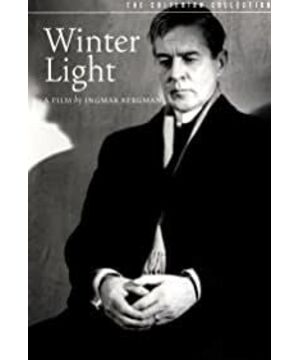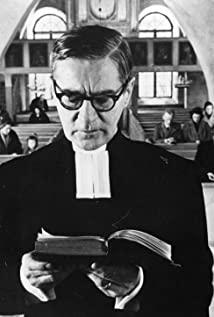Station B is back. Again, don't watch the Chinese subtitled version! Chinese translation of dog days, wasting my afternoon. For this reason, I stayed up all night again. Tired, long story short.
The relationship between Winterlight and Still in the Mirror is obvious. Not only are the protagonists the same, even the names of the people in the play, such as the suicide man's wife Karin, the man complaining that God sometimes turns into a spider image, are the same as the previous one. Most importantly, the logical premise that this film explores: God is love, and love is God, is the answer at the end of the previous film. And the film opens with the death of that premise.
According to the dialogue, the male protagonist doubts God and life so much because his wife died four years ago. He has a good relationship with his wife, and the film also repeatedly emphasizes that he loves his wife, so his wife's death is undoubtedly a deprivation of love to him. Without love, he can never find the existence of God. The incompetent male protagonist, in the face of the suicidal man's request for help, flinched, his eyes wandered, and in turn vomited bitterness, a flood of negative energy poured down, and finally scare the suicidal man away -- maybe the suicide of the suicidal man , and he made the final call.
The woman who is in love with the male protagonist, in fact, once again confirmed the incompetence of the male protagonist. My heart is blocked, because I have brought up too many memories of myself, and I am ashamed, so I will not repeat them. In short, the death of the wife makes the male protagonist "die" mentally. The absence of love makes God invisible.
If the characters are all speaking for the author and director, then it is obvious that Bergman's question is, do people always lose the ability to love? When it is hard to love anymore, does God die with me, like me? This question, the film's answer is hopeless.
A few more points. One is Bergman's lens. Large white, high-gloss tones throughout the film. Before the male protagonist said "I am free" and cried bitterly, the dazzling sunlight outside the window was a symbol of the Nordic polar day. If the sky of human nature faces extreme day and lacks the adjustment of night, it will be unbearable after all. Only at the moment of acknowledging the darkness, do not have to suffer the pain of tearing black and white, and finally be released.
The second is close-up and lighting. After the conversation with the suicidal man, a close-up of the male protagonist's face with strong light in the background. The male protagonist's monologue: "God, why did you abandon me?" This is also the cry of Jesus before his crucifixion recorded in Matthew's Gospel. The camera moves slowly at first and then slowly pulls, implying the uncertainty of belief, approaching and moving away. A very religious shot.
In fact, the most shocking thing about watching this film lies in its own resonance and correspondence. The death of love, the indifference to God, the ruthlessness, the lack of love covering the deceased, and the guilt of betrayal are all the dark years we have experienced. Even now, why not in the dark? what is love? It is God, yes, but from another angle, it is also the desire to live. However, life is bound to die, and in the winter when all things wither, the ceremony of death will finally be ushered in. This kind of reincarnation year after year, how to get rid of it?
View more about Winter Light reviews











